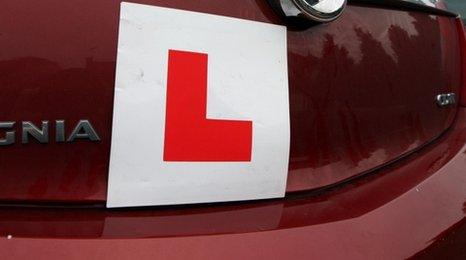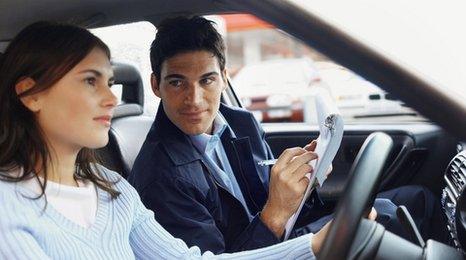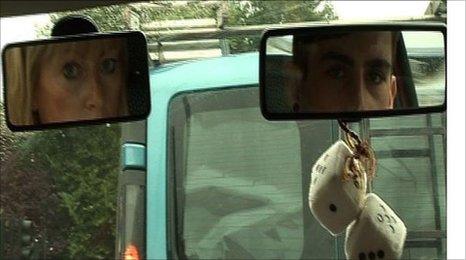Your views on changes to DSA driving theory tests
- Published
Multiple-choice questions used in the theory element of the driving test will no longer be published in learning material from January.
The Driving Standards Agency (DSA) wants learner drivers to think more and not just learn the bits they need to pass an exam.
For the past 15 years, learner drivers have had to pass a theory test before they can take their actual driving test.
Twenty-year-old dancer Sarah White from Dumfries remembers the fear as she walked in to take her theory test.
"I was really scared," she said. "So much revision, so many questions."
Sarah passed first time after memorising all the possible questions and answers.
But two years on, can she remember any of it? Newsbeat asked her one of the questions you may get in the test.
"You're towing a trailer on a motorway. What is your maximum speed limit? 40, 50, 60 or 70mph?"
Sarah guesses 50. In fact, the answer is 60.
"I can't remember half of it," she admitted.
Sam works in a clothes shop. He thinks some of the questions are stupid.
He told Newsbeat about one he had: "There's a motorbike accident, what do you do?
"Take his helmet off, move him, comfort him until an ambulance arrives or offer him a cigarette. It's ridiculous."
There will still be two parts to the theory test, which costs £31 for the basic licence.
First, there is the multiple choice questions that last just under an hour.
The big difference is that the wording will be different from any of the handbooks you can look at when you're revising.
The second part of the test, where you watch video clips trying to spot developing hazards, is unchanged.
You've been getting in touch on the Newsbeat Facebook page.
Kirsty says she's booking her theory soon and dreading it now because of the change.
Lisa says: "Good. The fewer people who pass, the fewer idiots I have to deal with".
And Wesley wrote: "It's common knowledge anyway, if you fail you shouldn't be on the road."
Prince is a 21-year-old student in London.
He said: "Knowing all this stuff off by heart doesn't necessarily justify the fact that you should be driving on the roads."
Juliet Mahon is also studying in the capital.
"I think it's safe enough as it is," he said. "I don't think it will make a difference, it's only making it harder for us."
But Katie Khan told Newsbeat it's a great idea.
"It sounds like it's becoming a little bit more instinctive rather than learning stuff by rote," she said. "I think it will mean there are better drivers on the road."
- Published22 November 2011

- Published4 August 2011

- Published4 October 2010
